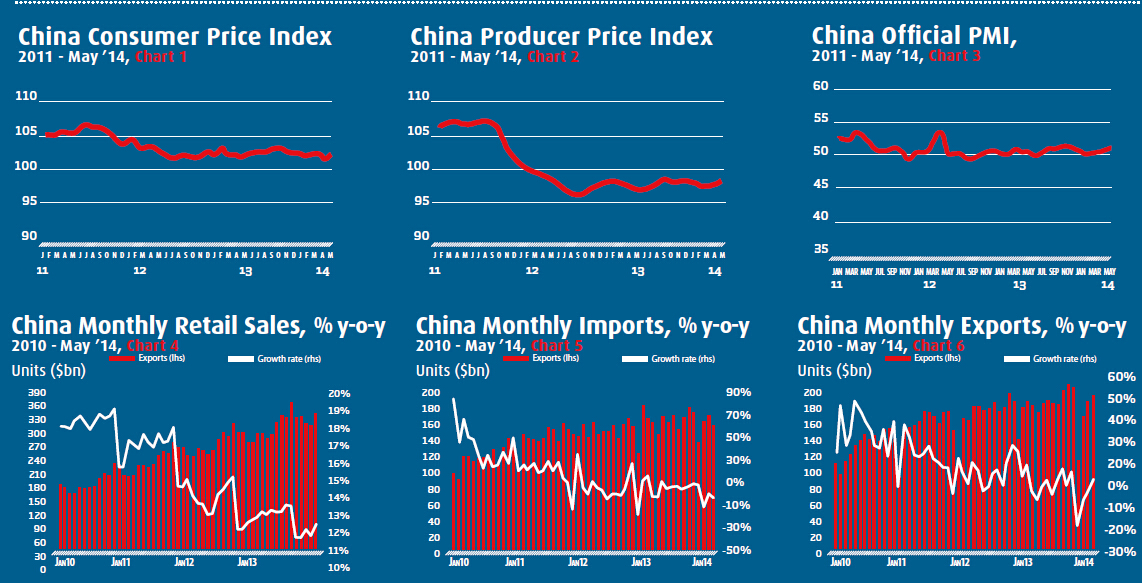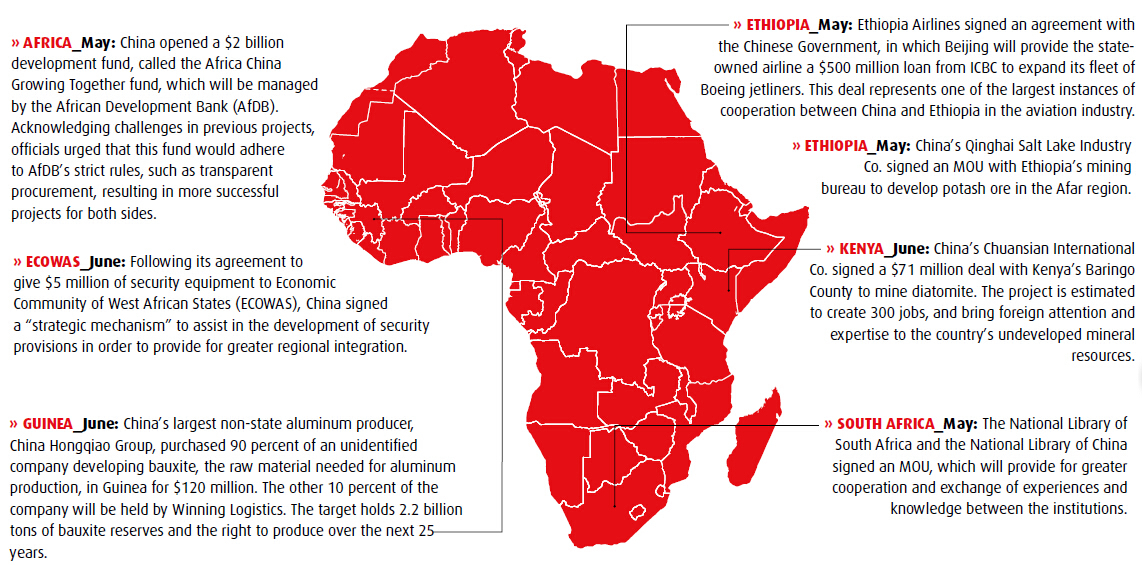| 
SLOW GROWTH IN CHINA'S ECONOMY BRINGS MIXED RESULTS
Beijing's "mini-stimulus" plan began to demonstrate an impact on the economy in May, however, China's property sector continued to slide, with housing sales falling 10.2 percent to $317.3 billion in the first five months of 2014. This development has far-reaching impacts - reducing growth in the construction industry and lowering steel prices across global markets. Wary of overcapacity and reliance on the housing sector for economic growth, Beijing began to tighten control over the nation's housing policy several years ago by restricting multiple home purchases and squeezing credit for the market. Today, local governments are easing restrictions on the housing market to stimulate demand.
Murky figures indicate stabilizing growth
Altogether, these figures indicate that China's economy is stabilizing. Analysts suggest that while Beijing's stimulus may serve to stimulate growth, the dominating trend in the sluggish housing market will likely continue to draw GDP down somewhere between 0.5-0.75 percent across the whole year. However, strong export growth and inflation data have proven to be stronger forces, continuing to propel China's economy further. Next month will bring GDP figures for the first half of 2014, which will provide a clearer picture of China's economic situation.
Exports up
Trade data showed mixed results, with imports falling 1.6 percent in May over the same period last year. Exports, however, rose 7 percent over last May, a trend which analysts anticipate will continue. This growth pushed the trade surplus to $35.9 billion, a five-year high, which is almost double the figure in April.
Indications of growth in manufacturing
Official figures revealed that the Purchasing Manager's Index had hit 50.8, a four-month high, from April's 50.4, demonstrating growth in manufacturing activity and an overall stabilization in China's economy. The Consumer Price Index (CPI) also indicated modest growth with a 2.5-percent year-on-year increase in May. This contributed to higher than expected retail sales, which grew by 12.5 percent to $342 billion. Inflation figures will continue to be impacted by the yuan's recent devaluation, which finished at 6.21 to the dollar in mid-June. This rapid change may indicate an end to the central bank's attempt to weaken the yuan. The central bank had orchestrated a 3-percent depreciation rate in early 2014 to boost exports.

CHINA: NIGERIA'S KEY DEVELOPMENT PARTNER
In the second quarter of 2014, Nigeria "rebased" the country's economy by readjusting calculation methods and adding several previously excluded areas of the economy into the nation's official calculation of its GDP. As a result, Nigeria's GDP nearly doubled from $262.2 billion in 2012 to $510 billion in 2013, resulting in the West African country's economy surpassing that of South Africa to become the largest in Africa. This development also highlighted the shifting nature of the country's economic growth following constant political developments that choked the country's growth in the 20th century. Additionally, Nigeria, in its political instability, presents an unattractive market for Western investors. Chinese investors, however, have fewer options available and see the Nigerian market as an attractive area for growth in its efforts to improve energy security and provide another market for its construction and manufacturing firms.
China's engagement with Nigeria has presented some key areas of growth in the nation, particularly with regard to construction of infrastructure, development of petroleum reserves, telecommunications equipment, increasing access to electricity and expansion of inexpensive consumer goods. In fact, trade between the two nations ballooned from $2 billion in 2002 to $13 billion in 2013. Analysts estimate that the actual value of trade between the two nations, however, is as much as 3 to 4 times the recorded value due to the high level of smuggling of Chinese products into Nigeria.
China Civil Engineering Construction Corp. (CCECC), which claims to be the second largest construction firm in Nigeria, has made a massive contribution to the construction of key transportation infrastructure in Nigeria in the 21st century. Famous projects include the $876 million, 200-km Abuja-Kaduna railway and new international airport terminals in Abuja, Lagos, Port Harcourt and Kano.
Nigeria has huge oil and gas reserves that have henceforth remained undeveloped due to the Nigerian Government's repeated canceling of contracts to develop drilling and refining facilities. Each change in Nigeria's tumultuous political administration has resulted in dramatic policy changes, which have reduced the feasibility of large projects requiring a long run-up time. Chinese petroleum developers, however, seem to have learned from their previous mistakes and have continued to engage Nigeria because of the impressive potential of the nation's petroleum industry.
With a population of 174 million, Nigeria is the most populous nation in Africa and the seventh most populous nation in the world. Chinese firms recognized Nigeria as an appealing potential consumer market at an early stage. Officially, Nigeria sourced a growing 21.5 percent of its commodity imports from China in 2013.
Though the recorded growth resulting from the rebasing of Nigeria's economy does not truly represent real economic development, investors will look on Nigeria's economy in a new way and investment flows are likely to increase due to the apparent increase in the size of the opportunity in Nigeria.
However, Nigeria will continue to face serious challenges to its sustained development due to its below average life expectancy, dismal education standards and low GDP per capita. Moreover, Nigerian and Chinese officials continue to meet for what have been, up to this point, unsuccessful attempts to reduce Nigeria's dramatic trade deficit with China.
» Africa_May: China opened a $2 billion development fund, called the Africa China Growing Together fund, which will be managed by the African Development Bank (AfDB). Acknowledging challenges in previous projects, officials urged that this fund would adhere to AfDB's strict rules, such as transparent procurement, resulting in more successful projects for both sides.
» ECOWAS_June: Following its agreement to give $5 million of security equipment to Economic Community of West African States (ECOWAS), China signed a "strategic mechanism" to assist in the development of security provisions in order to provide for greater regional integration.
» Guinea_June: China's largest non-state aluminum producer, China Hongqiao Group, purchased 90 percent of an unidentified company developing bauxite, the raw material needed for aluminum production, in Guinea for $120 million. The other 10 percent of the company will be held by Winning Logistics. The target holds 2.2 billion tons of bauxite reserves and the right to produce over the next 25 years.
» Ethiopia_May: Ethiopia Airlines signed an agreement with the Chinese Government, in which Beijing will provide the state-owned airline a $500 million loan from ICBC to expand its fleet of Boeing jetliners. This deal represents one of the largest instances of cooperation between China and Ethiopia in the aviation industry
» Kenya_June: China's Chuansian International Co. signed a $71 million deal with Kenya's Baringo County to mine diatomite. The project is estimated to create 300 jobs, and bring foreign attention and expertise to the country's undeveloped mineral resources.
» South Africa_May: The National Library of South Africa and the National Library of China signed an MOU, which will provide for greater cooperation and exchange of experiences and knowledge between the institutions.
. |